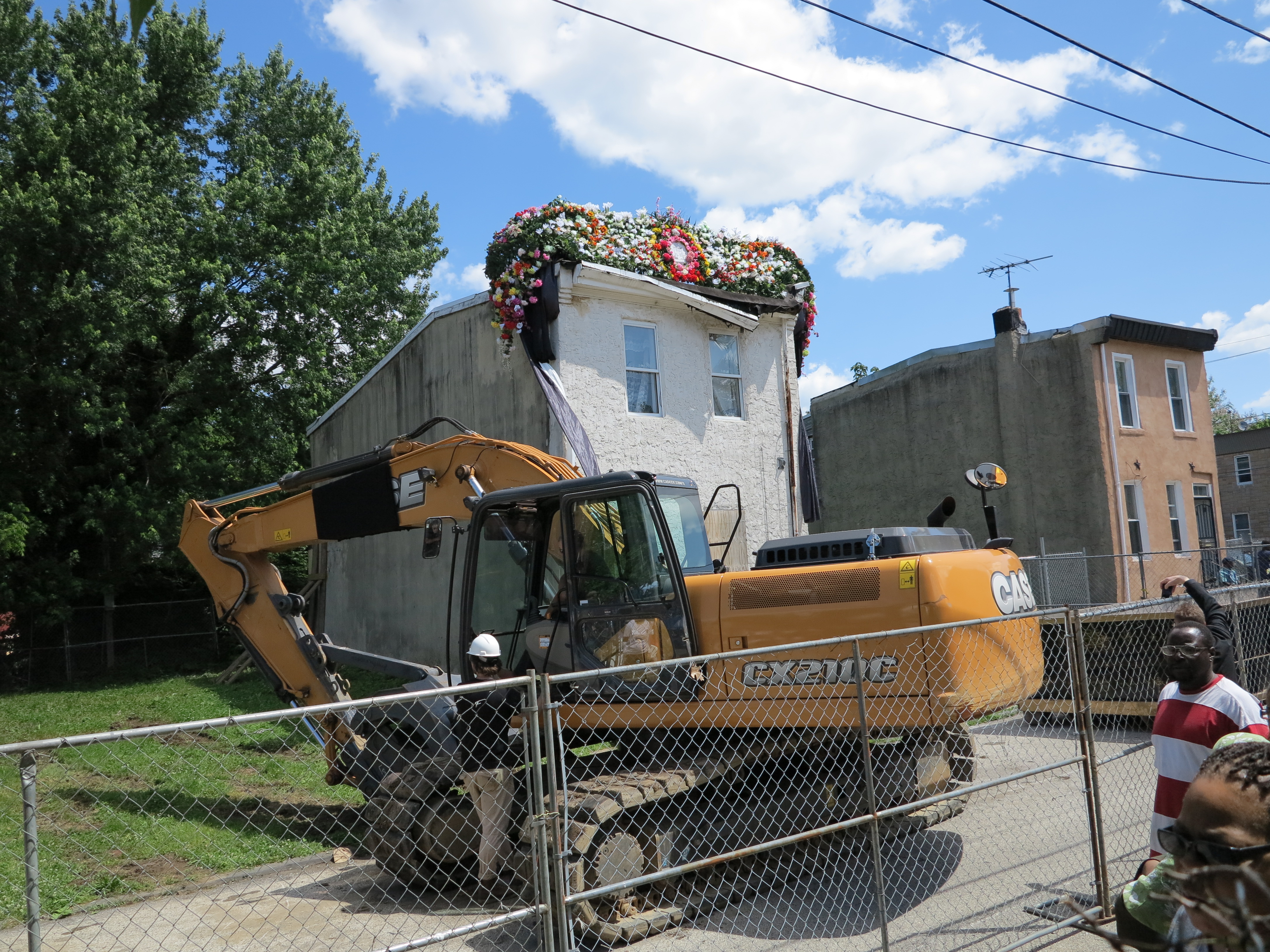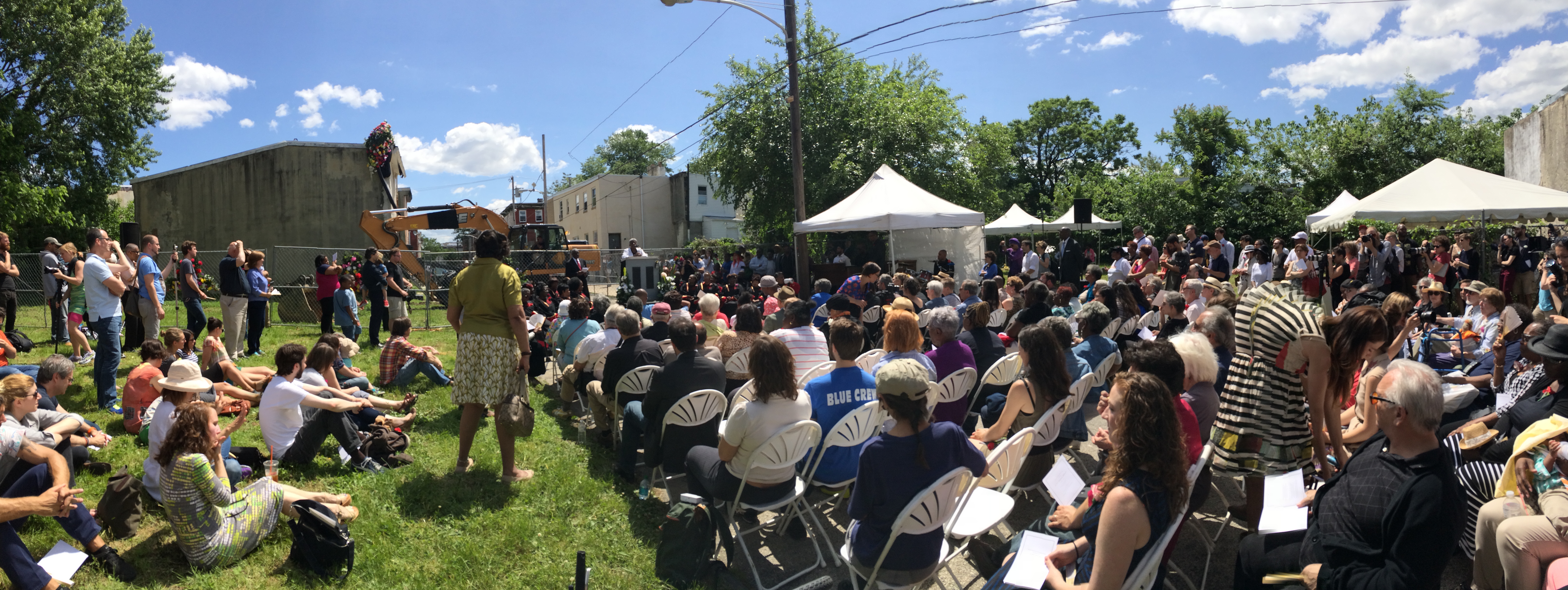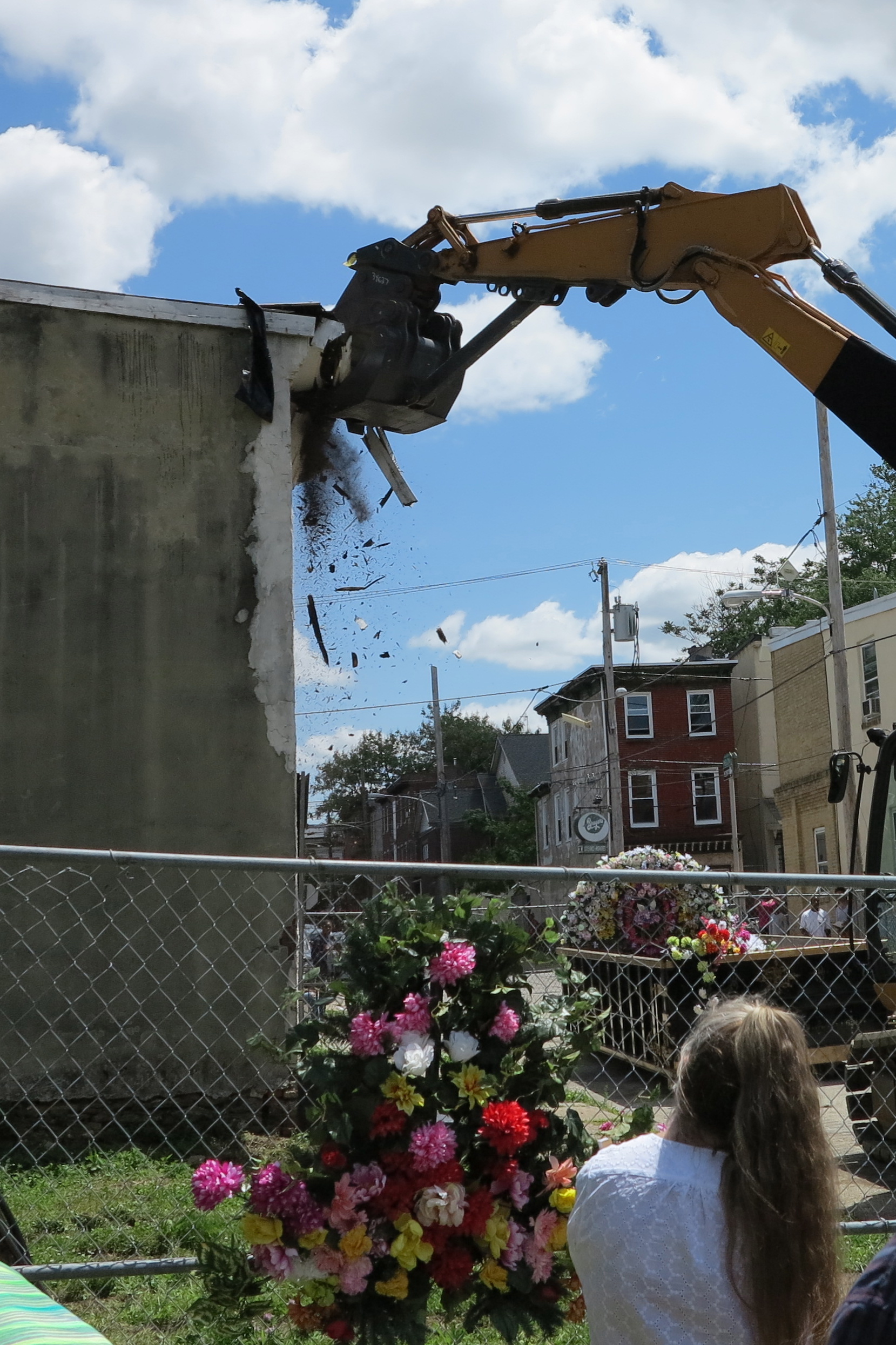Dust to Dust: 3711 Melon Street’s homegoing

This weekend Mantua bid farewell to a 142 year resident – 3711 Melon Street. This house was reduced to a heap of bricks, but not without a sometimes tearful, sometimes jubilant celebration of its life.
The occasion was the culminating event of a “social practice art” project called Funeral for a Home, which spent a year focused on 3711 Melon, through Tyler Contemporary at Temple University’s Tyler School of Art.
The funeral itself – perhaps more aptly, the “homegoing” – was a beautiful sendoff. The day was bright and warm. Paper fans given to those attending said “Peace be to this house,” a verse from Luke. People wore carnations, some clad in black to mourn others in white to express rebirth. The voices of Mt. Olive Baptist Church’s choir washed Melon Street in gospel. Mt. Olive’s Rev. Harry Moore, Sr. imbued the proceedings with gravitas and hope.
“These homes are like individuals,” he reminded us. “Up one day and down the next.” In time they, like all of us, meet the same eventual fate: Dust to dust.
The house itself, draped for the day with a cornice-line floral arrangement, was otherwise like thousands upon thousands of lost buildings across our city: a shell standing in a field of vacancy. Unlike all of the others in this city that collapse or are razed each year with little thought, 3711 Melon was lavished with attention.
Rev. Moore eulogized and preached, a ceremonial demolition took place, followed by a neighborhood procession – complete with a drumline and “Amazing Grace” played on strings – followed by lunch in the street.

Funeral for a Home was led by artists Jacob Hellman, and the Dufala brothers Steven and Billy, along with public historian Patrick Grossi. The project team spent an entire year considering this single rowhouse in close partnership with community members. Earlier property possibilities in other neighborhoods didn’t work out – including one that the city demolished because of its poor condition. Despite a cruel winter and unstable rear wall 3711 Melon, owned by a housing developer, stood strong long enough for close scrutiny. In Mantua they found fertile ground ripe for conversations about community planning and heritage. Over the last year the project team learned about the building and the neighborhood’s past, talked with relatives of 3711 Melon’s residents, and cultivated community conversation in Mantua.
The whole idea would have rung hollow without earnest engagement with Mantua residents and institutions. Events like walking tours and public conversations, deep listening, and historical research gave this project rich dimension. The artists didn’t parachute in. They embedded. They went to church so much that Rev. Moore joked he’d ask them to start tithing.
Art won’t mend Mantua’s troubles with unemployment or vacancy, but it opened a door. At first the idea of a funeral for a home was obtuse for a lot of people beyond the project’s inner circle. But the project provided a new and perhaps more neutral arena for important conversations about Mantua’s past and aspirations for its future.
A funeral is the period at the end of a hopefully long verse. It is the occasion to honor memories and to mark change. Time slows as we acknowledge the passing, and we let ourselves ruminate.
3711 Melon Street is as unremarkable as any rowhouse but in its commonness is its power. It was the backdrop to family life, and a piece of the fabric of Mantua. Houses are of course the places we live our lives – the everyday and the extraordinary – the spaces where we eat breakfast and experience heartbreak, where we mark birthdays or mourn a loved one are one in the same.
This house was also a home. It has stories to share that speak to family life and Mantua’s past if we bother to ask. In a city with thousands of vacant buildings, it’s hard to focus on that. By concentrating on a single house, we are invited to see it as a symbol.
What happens when a house is no longer a home? What happens when neighborhoods bear the burden of empty houses, waiting for a brighter day?
Part of Funeral for a Home sought to uncover history in the mundane, record memories, and place this building into the community’s story. By putting a fine point on one building, its story, its block, its neighborhood, we can acknowledge forces and processes that are changing the face of neighborhoods like Mantua: Vacancy, emergency demolitions, tax-delinquency, development pressure, zoning, public investment.
Early in its life 3711 Melon was home to renters, mostly working-class Irish, then in 1946 Leona Richardson, an African American, working single mother, purchased it. She passed in 2002. Several of her relations attended Saturday’s proceedings and spoke to her time in the house and of Mantua’s rich community life and history, and what has been lost over the years.
Funeral for a Home is a unique project, one we’re not likely to see again. It is just one part of a brewing conversation in Mantua that’s as much about looking back as it is about the future.
It is, as Mantua Civic Association President D’Wayne Drummond reminded the crowd, time to “plan or be planned for.” This community is ready for a better day, one they help shape, so Drummond said “don’t agonize, organize.”
When Mt. Olive Baptist Church’s choir sang “There’s a Leak in this Old Building,” it was meant in a figurative and literal sense. When the body fails the soul needs to move on. When the house becomes a shell, it may be time to open up to the new.
Of course a homegoing is not just about mourning. It is about a new day, which imbued the proceedings with an aspirational air. Instead of lamentations, there was also hope that this house will become a symbol of rebirth, for Melon Street, for Mantua. The resurrection for this block: affordable housing on the way.

WHYY is your source for fact-based, in-depth journalism and information. As a nonprofit organization, we rely on financial support from readers like you. Please give today.





